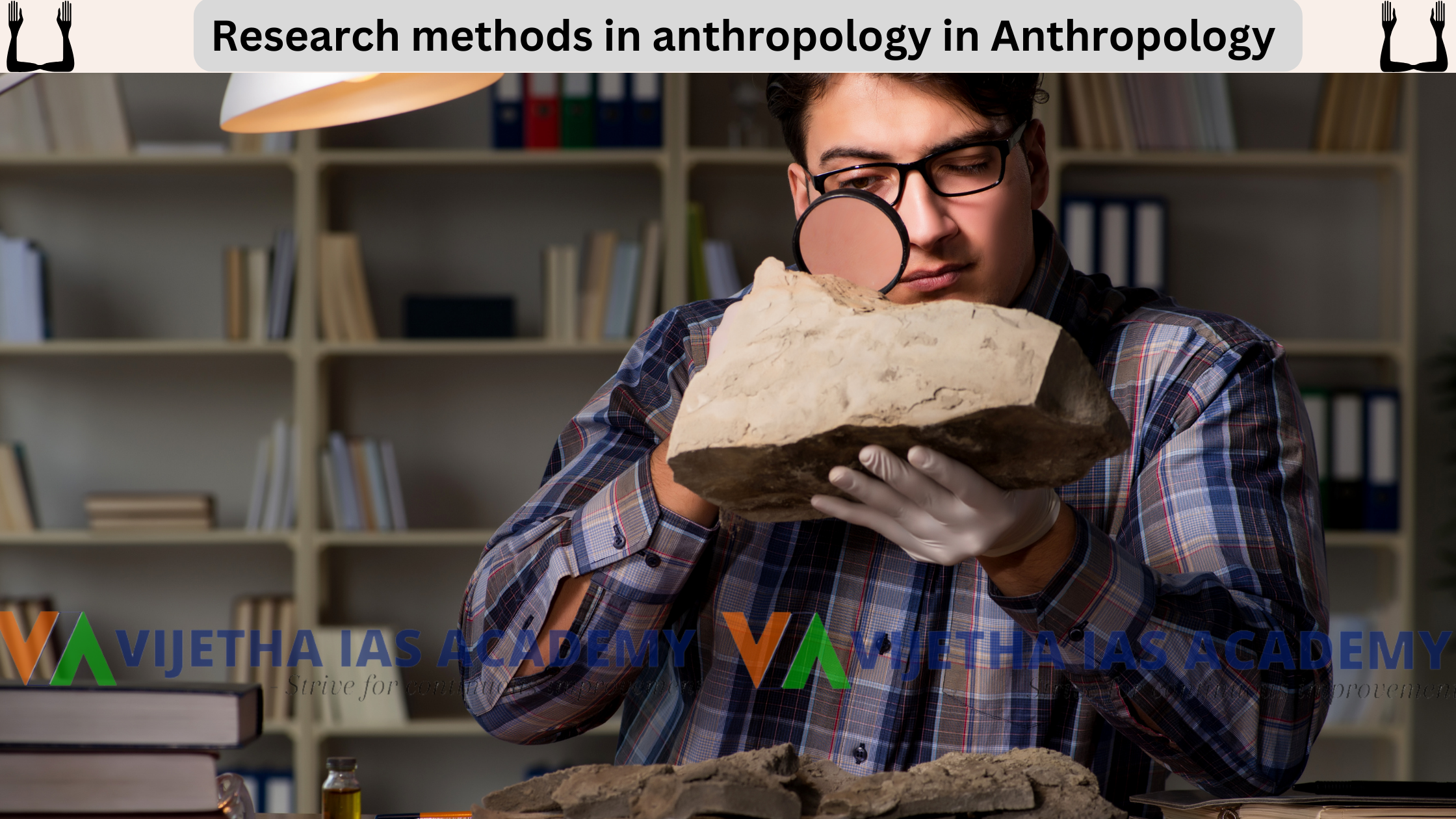Research methods in anthropology in Anthropology Optional for UPSC
Research methods in anthropology in Anthropology Optional for UPSC
-
Author : Vijetha IAS
-
Date : {{ formatDate("Wed May 29 2024 17:17:57 GMT+0530 (India Standard Time)") }}
-
Category : Current Affairs,

Research Methods in Anthropology for UPSC Optional
Anthropology is a fascinating field that delves into the complexities of human societies, cultures, and biological aspects. For UPSC aspirants, choosing Anthropology as an optional subject can be a strategic move, given its comprehensive syllabus and scoring potential. One of the crucial components of Anthropology in the UPSC syllabus is understanding research methods. This blog post will explore various research methods in anthropology and how mastering them can significantly enhance your preparation for the UPSC exams.
Understanding Research Methods in Anthropology
Research methods in anthropology are diverse, covering both qualitative and quantitative approaches. These methods enable anthropologists to gather data, interpret human behavior, and understand cultural phenomena comprehensively. The primary research methods include participant observation, ethnography, surveys, interviews, and case studies.
-
Participant Observation: Participant observation involves immersing oneself in a community to observe and participate in their daily activities. This method helps anthropologists gain an in-depth understanding of a community’s social dynamics, rituals, and traditions. For UPSC aspirants, understanding this method is crucial as it often forms the basis of ethnographic studies discussed in the exam.
-
Ethnography: Ethnography is the detailed study of people and cultures. It involves extensive fieldwork, where the researcher lives among the people being studied for an extended period. This method provides rich, qualitative data that offer insights into the intricacies of human societies. Knowledge of ethnographic methods is essential for answering questions related to cultural anthropology in the UPSC exam.
-
Surveys: Surveys are used to collect data from a large number of respondents through questionnaires. This quantitative method helps in understanding patterns, behaviors, and opinions within a population. In the context of UPSC, knowing how to design and interpret surveys can help in addressing questions on anthropological research methodologies and data analysis.
-
Interviews: Interviews are a qualitative method where researchers conduct one-on-one or group discussions to gather detailed information. There are various types of interviews, including structured, semi-structured, and unstructured. Each type serves different research purposes, and familiarity with these can aid in crafting comprehensive answers in the UPSC exam.
-
Case Studies: Case studies involve an in-depth analysis of a particular individual, group, or event. This method helps in understanding complex phenomena within their real-life context. UPSC aspirants can benefit from studying case studies as they often illustrate key anthropological concepts and theories.
Why Choose Anthropology as an Optional for UPSC?
Anthropology as an optional subject has gained popularity among UPSC aspirants due to its multidisciplinary nature, relatively short syllabus, and high scoring potential. The subject covers various aspects of human evolution, culture, society, and biological diversity, making it an interesting and enriching choice. Additionally, the overlap with General Studies papers can provide an added advantage.
Integrating Research Methods in Your Preparation
To effectively prepare for Anthropology optional, it’s essential to integrate the understanding of research methods into your study plan. Here are some strategies:
-
Comprehensive Study Materials: Utilize quality study materials and resources that cover all aspects of research methods in anthropology. Books like "Research Methods in Anthropology" by H. Russell Bernard and "Anthropological Research: The Structure of Inquiry" by Pertti J. Pelto can be invaluable.
-
Guidance from Experts: Enroll in coaching classes that offer specialized courses in Anthropology optional. Institutes like Vijetha IAS Academy provide comprehensive coaching and expert guidance from seasoned educators like Kishore sir Anthropology. Their structured approach and insights can significantly enhance your understanding and application of research methods.
-
Practice Previous Year Papers: Solving previous year question papers is crucial. It helps you understand the type of questions asked in the exam and how to approach them. Focus on questions related to research methods and practice writing detailed, structured answers.
-
Fieldwork and Practical Experience: If possible, engage in some form of fieldwork or practical experience. This could be through internships, projects, or volunteering with organizations working in anthropological research. Practical exposure can deepen your understanding and provide real-world examples to discuss in your exam.
-
Peer Discussions and Study Groups: Join study groups or online forums where you can discuss and exchange ideas with fellow aspirants. Platforms like these can provide diverse perspectives and help in refining your understanding of complex concepts.
Conclusion
Mastering research methods in anthropology is vital for excelling in the Anthropology optional for UPSC. A thorough understanding of participant observation, ethnography, surveys, interviews, and case studies can provide a solid foundation for answering questions accurately and comprehensively. By integrating these methods into your preparation strategy, leveraging expert guidance from institutes like Vijetha IAS Academy and educators like Kishore sir Anthropology, and engaging in practical experiences, you can enhance your performance and achieve your UPSC goals. Anthropology offers a unique blend of scientific and humanistic perspectives, making it a compelling and rewarding choice for UPSC aspirants.

-1731666162706.webp)